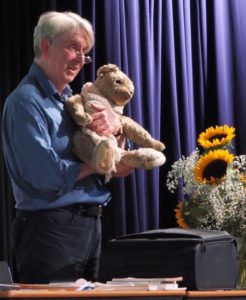It is hard to think of any other living author whose work has made such a contribution to the cultural life of young children. He is the one who finds the stories behind the nursery rhymes and puts the rhymes into fairy stories. The cataloger of babyhood and the bard of the classroom, Allan Ahlberg has been a gentle presence in young lives for over five decades.
But as the mind behind Burglar Bill, Allan is also the master of mischief. And so his Pearce lecture proved him to be. He had clearly signalled his intentions through an uncoventional title, but still, somehow, we were taken by surprise by this extraordinary tour of the Ahlberg imagination. By turns, funny, poignant and thought-provoking, Allan never let the audience settle into simply being lectured. From his seat by the sunflowers, he led us through a series of vignettes, snapshots, meditations.
He read letters from children – “Dear Mr Ahlberg, My favourite author is Dick King Smith …” He played us snatches of music – Sibelius, “Some Enchanted Evening”. He let us observe his delight in wandering serendipitously around a page of the Oxford English Dictionary. He read to us from Strunk and White’s Elements of Style. He marvelled at why there is something, and not nothing. He sang to us. He had brought his beloved bear.
Here, then, the familiar themes and elements of an Ahlberg work were arrayed in all their extraordinary variety: a sense of audience (with an accompanying sense of humility), an ear for harmony and the aural qualities of literature; a fascination with words and meanings; a feeling for style and propriety; a sense of wonder; an affinity with the objects of childhood; love.
As the old maxim goes, he showed, but didn’t tell. Like his books, this was a talk that allowed its audience their part, to complete the story. All all worked together like a multimodal text that is more than the sum of its parts. And all was held together by a gracious presence, as summed up by a teacher in the audience:
“I looked around the hall at one point and saw lots of faces I knew: teachers and lecturers and parents of children I had taught. There was such respect, admiration and love in the room. We were in the presence of someone who had given us so much.”
Debbie Pullinger

